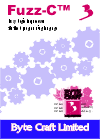- | Home |
- Company |
- Contact |
- News |
- S/ware Eng |
- Standards |
- Academic Support |
- Documents |

- | Requirements |
- Compilers |
- Validation |
- RTOS |
- Analysis |
- Hardware |
- Software |
- Resources |
- Products |
Byte Craft Fuzzy Logic C Preprocessor

Byte Craft Limited has a long history of using Fuzzy Logic to great advantage in embedded systems.
The easiest way to describe Fuzzy Logic is as a tool that helps describe complex algorithms in an intuitive way. It helps you focus on what is important, in your own terms, about your program design problem. It helps you stay in the problem space rather than dwelling in the solution space.
Byte Craft Limited supports Fuzzy Logic in embedded systems with the Fuzz-C™ Fuzzy Logic preprocessor. This tool interprets Fuzzy Logic directives within C source code, and generates the necessary programming to make Fuzzy Logic calculations within your program
.
This section gives some information on our support of fuzzy logic, and resources you can use
Documentation
We have included a sample of C code that uses Fuzz-C extensions, and the resulting C code suitable for compilation. The original source as written by the user incorporates linguistic variable declarations and fuzzy operations. The preprocessed code contains straight C translations of fuzzy membership functions, as well as simple graphs of the domains that the functions encode.
There are also several technical paper on Fuzzy Logic brochure. The technical paper Linguistic variables
and accompanying files
The paper refers to the following:-
| PRICING.fuz | The fuzzy logic pricing example. |
| PRICING.C | The generated C code for PRICING.FUZ. |
| PID.FUZ | A fuzzy PID controller. |
| PID.C | Generated code for PID.FUZ. |
| FUZZC.H | The Fuzz-C support header file. |
| GC.DFT | The Center of Gravity defuzzification template. |
There is also a book on the subject
